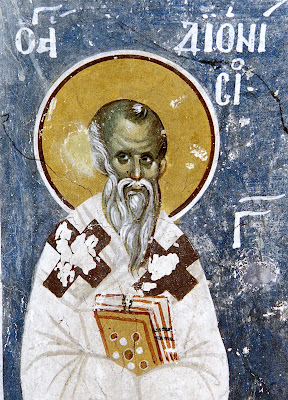 |
| St. Dionysios of Corinth (Feast Day - November 29) |
Verses
Dionysios performed sacrifices,
Approaching the sword, he is also a Martyr.
Approaching the sword, he is also a Martyr.
Saint Jerome wrote the following about Saint Dionysios, information of which he took from Eusebius, who placed him as being Bishop in the eleventh year of the Emperor Marcus Aurelius, which was 171.
"Dionysios, Bishop of the Church of Corinth, was of so great eloquence and industry that he taught not only the people of his own city and province but also those of other provinces and cities by his letters. Of these one is To the Lacedaemonians, another To the Athenians, a third To the Nicomedians, a fourth To the Cretans, a fifth To the Church at Amastrina and to the Other Churches of Pontus, a sixth To the Gnosians and to Pinytus the bishop of the same city, a seventh To the Romans, addressed to Soter their bishop, an eighth To Chrysophora a holy woman. He flourished in the reign of Marcus Antoninus Verus and Lucius Aurelius Commodus."
Eusebius knew a collection of seven of the Catholic Letters to the Churches of Dionysios, together with a letter to him from Pinytus, Bishop of Knossus, and a private letter of spiritual advice to a lady named Chrysophora.
Eusebius mentions (1) a letter to the Lacedaemonians, teaching orthodoxy, and enjoining peace and union. (2) Another letter was to the Athenians, stirring up their faith exhorting them to live according to the Gospel, since they were not far from apostasy. Dionysios spoke of the recent martyrdom of their bishop, Publius (in the persecution of Marcus Aurelius), and says that Dionysios the Areopagite was the first Bishop of Athens. (3) To the Nicomedians he wrote against Marcionism. (4) Writing to Gortyna and the other dioceses of Crete, he praised their bishop, Philip, for efforts on behalf of the Church then warned him of the distortions of heretics. (5) To the Church of Amastris in Pontus he wrote at the instance of Bacchylides and Elpistus (otherwise unknown), mentioning the bishop's name as Palmas; he wrote in this letter of marriage and celibacy, and recommended the charitable treatment of those who had fallen away into sin or heresy. (6) In a letter to Pinytus, Bishop of Knossus, he recommended that he should not lay the yoke of celibacy too heavily on his brethren, but consider the weakness most of them have. Pinytus replied, after polite words, that he hoped Dionysios would send strong meat next time so his people might not grow up on the milk of babes.
But the most important letter is the seventh one, addressed to the Romans, and the only one from which extracts have been preserved. Pope Soter had sent alms and a letter to the Corinthians, and in response Dionysios wrote:
"For this has been your custom from the beginning, to do good to all the brethren in many ways, and to send alms to many Churches in different cities, now relieving the poverty of those who asked aid, now assisting the brethren in the mines by the alms you send, Romans keeping up the traditional custom of Romans, which your blessed bishop, Soter, has not only maintained, but has even increased, by affording to the brethren the abundance which he has supplied, and by comforting with blessed words the brethren who came to him, as a father his children."
Again:
"You also by this instruction have mingled together the Romans and Corinthians who are the planting of Peter and Paul. For they both came to our Corinth and planted us, and taught alike; and alike going to Italy and teaching there, were martyred at the same time."
Again:
"Today we have kept the holy Lord's day, on which we have read your letter, which we shall ever possess to read and to be admonished, even as the former one written to us through Clement."
The witness to the martyrdom of the Apostles Peter and Paul, kata ton auton kairon, is of importance, and so is the mention of the Epistle of Clement and the public reading of it. The letter of the Pope was written "as a father to his children". Dionysios's own letters were evidently much prized, for in the last extract from this letter he writes that he wrote them by request, and that they have been falsified "by the apostles of the devil". "Small wonder then", he observes, "if some have dared to tamper even with the word of the Lord himself, when they have conspired to mutilate my own humble efforts."
It is believed he probably was Bishop until around 180, and after faithfully serving his flock he died a martyr's death by beheading, though there are no historical sources to confirm this. The Abbey of Saint Denis in France claimed to be in possession of the body of Dionysios of Corinth, alleged to have been brought from Greece to Rome, and given them in 1215 by Pope Innocent III.
Apolytikion in the Third Tone
Divine president, boast of Corinth, as the luminous vessel of the Spirit, wise Hieromartyr Dionysios; you offered your blood Venerable one, as a sacrifice to Christ. Wherefore intercede, that those who praise you may be granted atonement for our offenses and great mercy.
Kontakion in Plagal of the Second Tone
You received wise one, the grace of the Spirit, showing yourself to be, a radiant lamp of the Church, and a true shepherd of Corinth, O Dionysios, moreover you rejoiced in your contest, having fiery divine zeal; for this we cry out to you: Rejoice servant of Christ, wise hierarch.
Megalynarion
Rejoice divine shepherd of Corinth and divinely eloquent guide of piety; rejoice you who poured out your blood for Christ, and were carried off as an athlete, O Dionysios.
